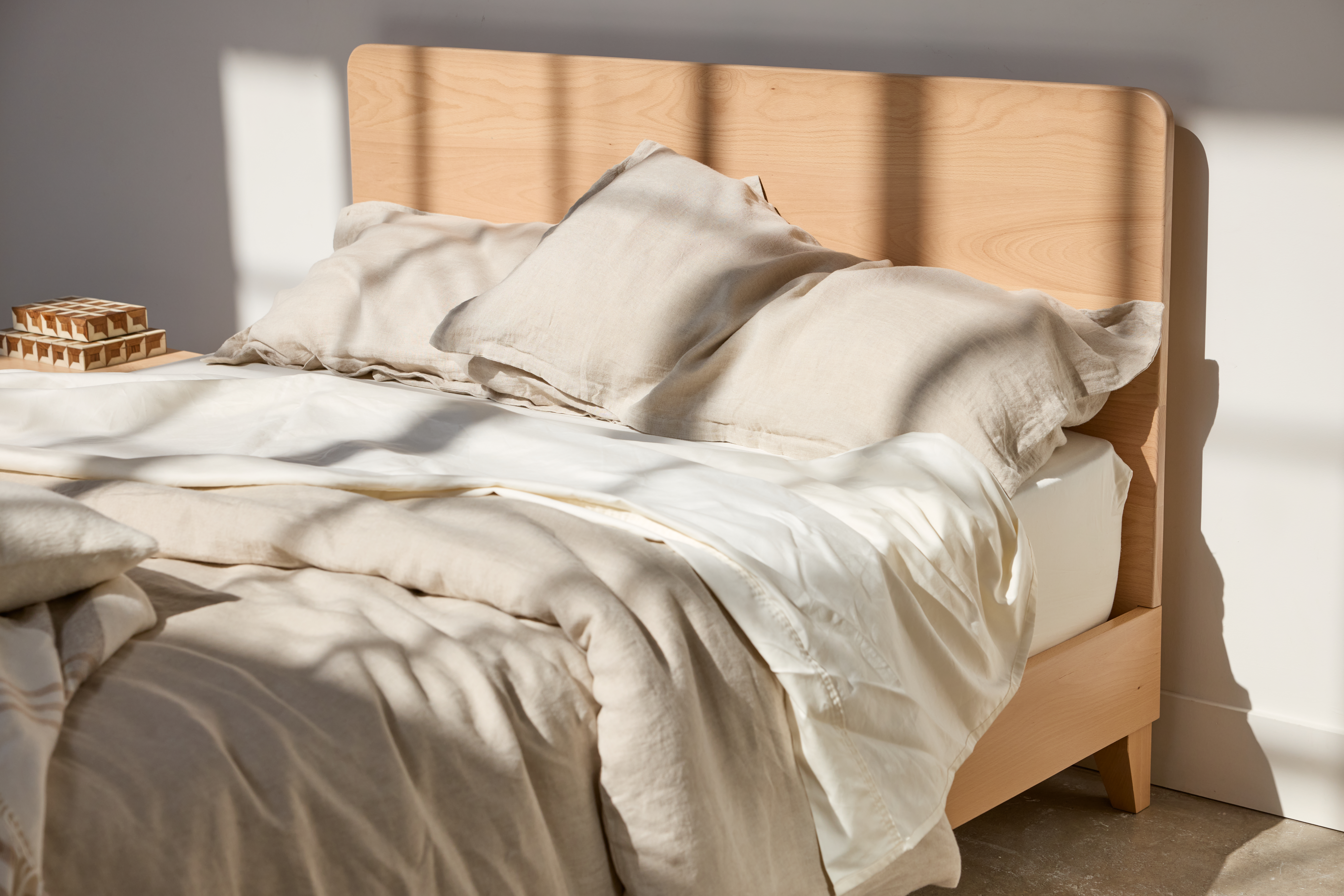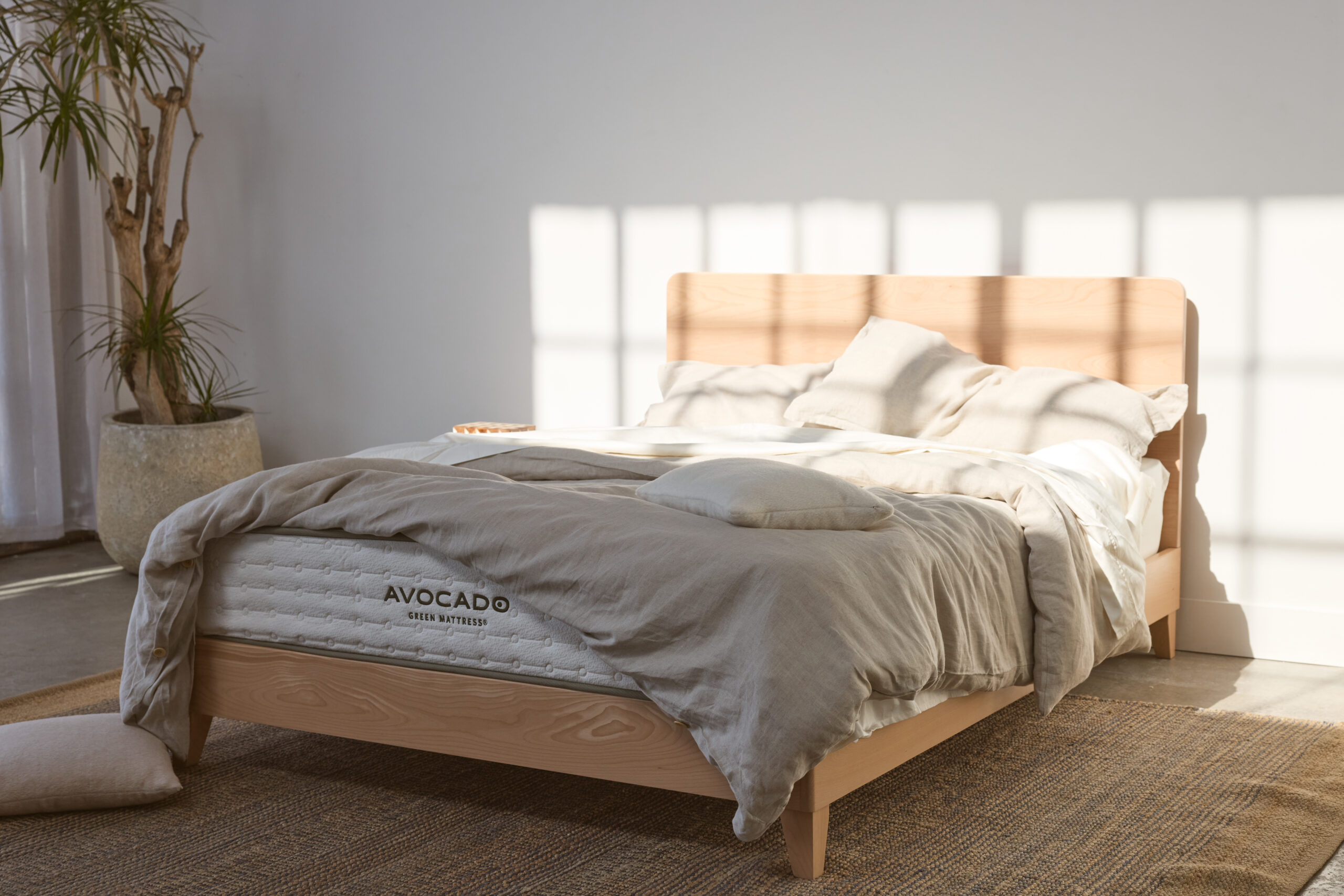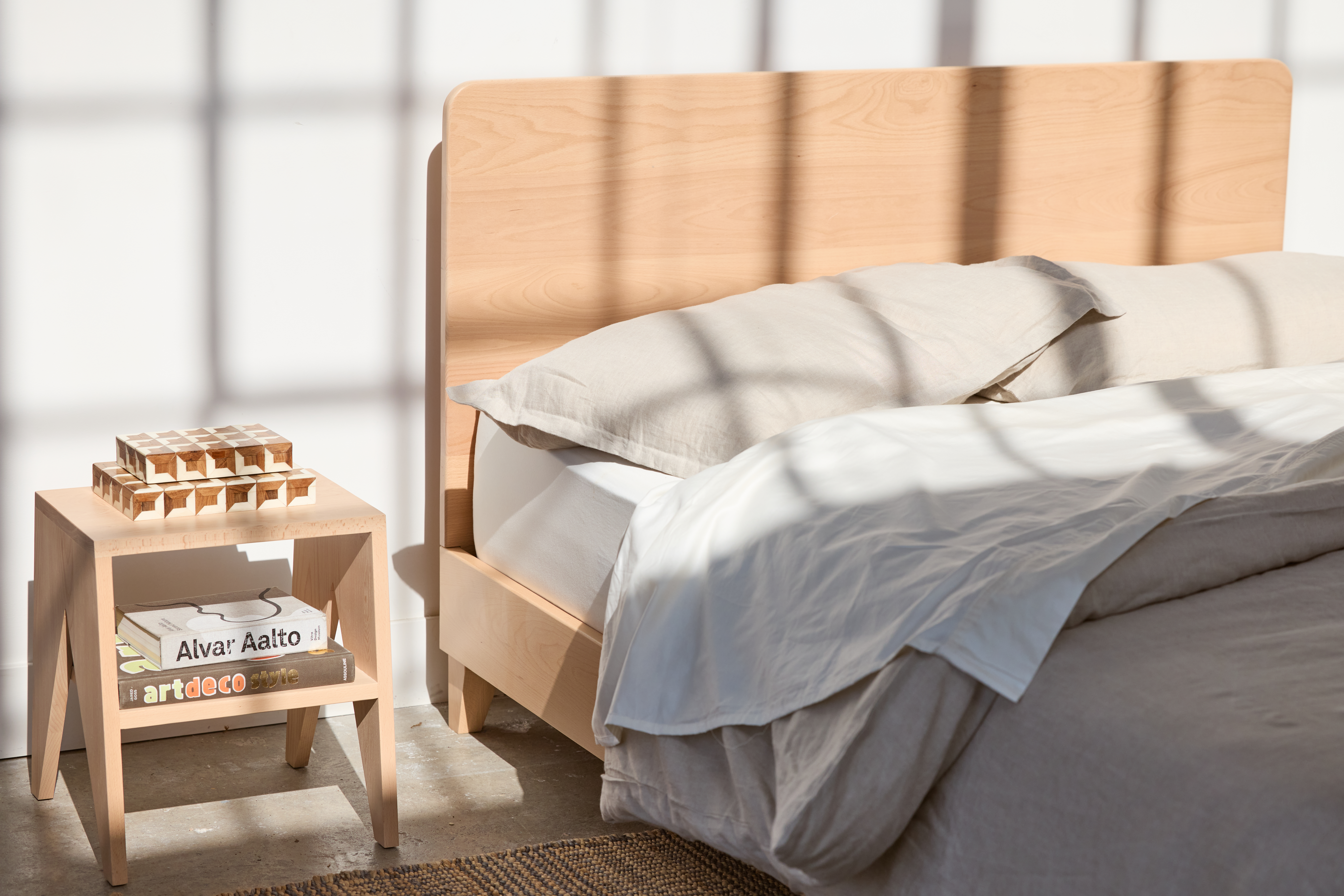Breathe easy and sleep cool all summer long with airy summer bedding and simple, sustainable bedroom updates.
Summer certainly has its perks — longer days, warmer weather, farmers’ markets, fresh blooms. Some of the season’s not-so-pleasant attributes? Pollen, humidity, and waking up a little sweaty — and somehow with slightly damp pajamas — no matter how high you crank the AC.
And while you probably went all-in on spring cleaning, vacuuming nooks and crannies, banishing dust bunnies, wiping down every surface, and ridding your home of clutter once and for all, you may have neglected to give your bedroom the upgrade required for a summer of restful slumber.
Most people don’t realize that the thick, warm bedding that keeps the winter’s chill at bay should be put in the linen closet once summer arrives. Or that mattresses and pillows made with synthetic materials could be keeping you up at night. Dusty curtains or blinds and humid, pollen-filled indoor air can also make it difficult to get a good night’s sleep.
That’s why it’s important to give your sleep sanctuary a summer-inspired facelift. Here’s how to update your bedroom sustainably for summer.

Read more: Sleep Quality Versus Sleep Quantity: What Matters More?
Down and down-alternative duvets and heavyweight wool comforters are ideal during the colder months. For summer, swap these out for something more breathable — like a lightweight alpaca duvet insert. The natural, renewable fiber is known for its superior breathability, plus it’s moisture-wicking and temperature-regulating, so you can still enjoy the cozy comfort of an extra layer without waking up glistening.
Now let’s talk duvet covers and sheets. Most bedding is made with petroleum-based materials, like polyester, rayon, and nylon. These synthetic fibers are cheap and easy to produce, but they’re also cleaned and processed with toxic chemicals. They also shed microplastics into the environment when washed, and they don’t breathe well.
That’s why it’s important to choose sustainable, airy bedding made out of organic cotton, organic hemp, or organic linen. These fibers are naturally breathable, hypoallergenic and antibacterial, don’t contain harsh ingredients or irritants, and are easy on the planet. They’re also key to staying cool on hot summer nights.
Read more: The Best Fabrics For Deep Sleep
Fiberglass, chemical flame retardants, harmful adhesives, and polyurethane foams don’t belong in your home or the bedroom. However, they’re all common mattress and pillow ingredients. Many of these substances release volatile organic compounds (VOCs) — like formaldehyde, toluene, benzene, phthalates, and more — through a process called off-gassing. Long-term exposure can lead to negative health consequences, like asthma, skin irritation, respiratory disease, fertility issues, and even cancer. What’s more, synthetic materials, like memory foam, trap heat from your body, making cool, deep sleep challenging.
What your mattress and pillows are made of matters. When you choose a bed and pillows made with sustainable, ethically sourced, certified organic materials, like organic cotton, organic latex, and organic wool (a natural fire barrier), you can rest assured that they’re healthy and safe for you, your family, and the environment. And before you take a company’s word, look out for industry-leading certifications, like the Global Organic Textile Standard, the Global Organic Latex Standard, and MADE SAFE®, to ensure the claims they’re making are validated.

Read more: Why Fiberglass Doesn’t Belong In Your Mattress
Curtains and blinds help keep the bedroom cool during the day and dark once the sun comes up — they also trap dust and pollen in the air. This isn’t necessarily a bad thing, especially if you like to open the windows on breezy, warm days. The caveat is curtains and blinds need to be cleaned well and often.
In the summer, vacuum the curtains once a week, and toss them in the wash or hand wash them every three months depending on the fabric. For blinds, wipe them down with a damp cloth at the same intervals as curtains and you’ll be breathing (and sleeping) easier in no time.
Read more: How to Create an Allergen-Friendly Home
Plants are an inexpensive way to decorate, but green girls also happen to be great at purifying indoor air. In fact, one study found that certain plants can rid a room of pollutants like carbon dioxide, VOCs, carbonyl, particulate matter, organic compounds, nitrates, sulfates, ammonia, and carbonate. You don’t have to have a green thumb, either. Some air-cleaning houseplants thrive with little attention, like the snake plant, peace lily, and aloe vera.

Read more: 10 Low-Maintenance Houseplants For Cleaner Air
This may sound counterintuitive, but a humidifier is a bedroom essential during the winter and the summer. Using an air conditioner to offset hot, humid days actually makes the air inside our homes super dry, which can exacerbate allergies and dry out skin and nasal passages. (You can kiss a good night’s sleep goodbye.) Placing a humidifier in the bedroom will increase the air’s moisture, hydrate your skin, help keep allergy symptoms to a minimum, and reduce the risk of getting a cold or flu. Once you have a humidifier, keep the humidity levels between 40 and 60 percent, clean it regularly, and change the filter frequently.
Read more: Humidifiers Have Huge Health Benefits — Here Are Our Favorites
Curtains and blinds act like air filters of sorts, but there’s no substitute for the real thing. A quality air filter removes mold spores, dust, airborne bacteria, pet dander, disinfectants, and smoke from indoor environments, which is especially important for those living in heavily polluted areas or near wildfire zones. Eliminating harmful substances in the bedroom will do wonders for allergies, asthma and other respiratory diseases, reduce the risk of illness, and improve overall well-being. Just make sure the air filter you choose is a HEPA, which is capable of removing 99.97 percent of air pollutants from .03 microns in size.

Read more: How to Improve Your Home’s Air Quality
Have feedback on our story? Email [email protected] to let us know what you think!

Shop Pillows
The Essential Organic Pillow Collection
Gentle, breathable, non-toxic support.







